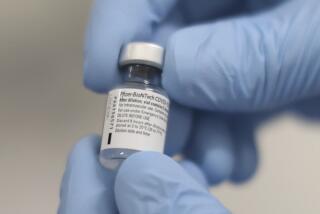Diabetes study has wide reach
- Share via
For people with adult-onset diabetes, the threats of heart disease and stroke are ever-present. They die of cardiovascular disease at rates two to four times higher than non-diabetics. As the number of people developing the disease grows, the need for better prevention of these side effects becomes more crucial.
In a few years, we may have it. Last month, the National Institutes of Health launched a massive study that could help people with Type 2 diabetes avoid these deadly complications. The study, involving about 10,000 adults, will take place at 70 health-care sites around the country and in Canada. It should end around 2010.
“We consider this one of the landmark clinical trials in diabetes,” said Dr. Denise Simons-Morton, project officer for the study at the National Heart, Lung, and Blood Institute.The study will explore three areas critical in helping diabetics reduce their risk of cardiovascular disease: blood glucose, blood pressure and cholesterol.
For diabetics, keeping blood sugar levels down helps prevent such well-known complications as nerve and kidney damage, but it also helps decrease the risk of a heart attack or stroke, says Simons-Morton. A major question the study will address is how low those levels should be. “What we don’t know is if you actively lower blood glucose to a near-normal level, is that going to prevent cardiovascular disease,” says Simons-Morton.
It’s not easy for diabetics to reduce glucose levels by that much -- one of the reasons why doctors often settle for levels that are still relatively high. Patients in the study, however, will be randomly assigned to different treatment groups, including one in which they will monitor their blood glucose several times during the day and take insulin and other medications in an attempt to bring it down to nearly normal.
“The question is, is it worth it?” says Simons-Morton. “The personal self-care that is required can have an effect on quality of life. There are potential side effects from having hypoglycemia [in which blood sugar levels drop abnormally low]. We don’t even know if lowering glucose levels that low is going to prevent cardiovascular disease.”
The study also will examine whether the health benefits are worth the costs of the intensive management. And organizers opted to include many types of health-care facilities in the trial to determine if the intensive-therapy regimen is practical in various settings. Study sites include HMOs, university hospitals, private practice offices, Veterans Health Administration clinics and Canadian hospitals.
As for blood pressure and cholesterol, it’s possible that a more rigorous approach to lowering those risk factors will help diabetics as well. But, again, many diabetics have trouble reaching the normal levels. In the blood pressure component of the study, some participants will be asked to try to lower their systolic blood pressure to 120 mmHg or less, a level well under what is currently recommended. In the cholesterol arm of the trial, scientists will study whether altering levels of HDL (good) cholesterol, LDL (bad) cholesterol and triglycerides is a better approach than reducing bad cholesterol alone.
In the end, the study should create a detailed protocol of how to approach heart attack and stroke prevention in people with Type 2 diabetes, says Simons-Morton.
“No matter what the study finds, it will influence the guidelines,” she says.
*
L.A. hospitals join in study
Two Los Angeles-area hospitals are enrolling volunteers in the study on controlling cardiovascular risk in diabetics. Participants must be adults with Type 2 diabetes who have at least one major risk factor for cardiovascular disease, such as high blood pressure or a history of heart attack. Volunteers will remain in the study for about five to eight years. To inquire about enrolling contact:
* White Memorial Medical Center (East Los Angeles), (323) 881-8838.
* Northridge Hospital Medical Center, (818) 885-8500, Ext. 2287.






